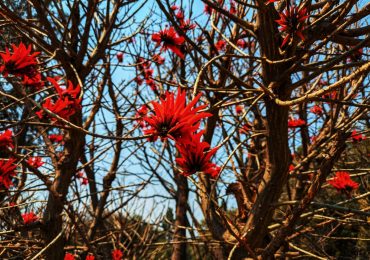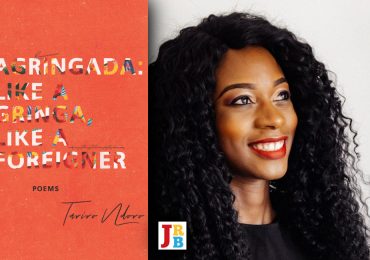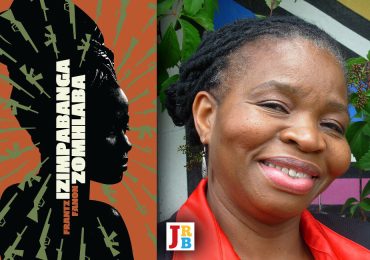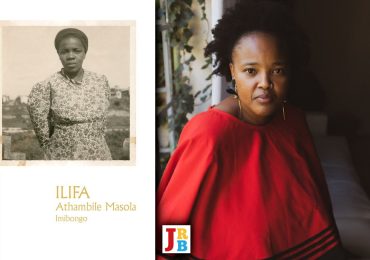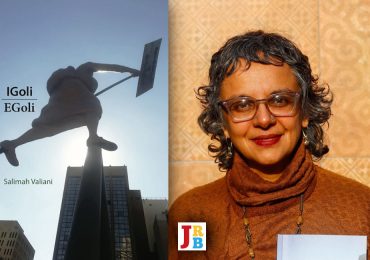The longlist for the eighth annual Sol Plaatje European Union Poetry Award has been announced by the Jacana Literary Foundation.
Sixty-three poets have been chosen for the longlist, from the almost five hundred poems that were submitted in ten of South Africa’s official languages.
The award is named after political and social activist Solomon Tshekisho Plaatje (1876–1932), and aims to reveal ‘the political and social attitudes of our time’ and reflect ‘the complex, nuanced and uncomfortable truths of life in South Africa’.
Last year’s winner was Moses Seletisha, for his Sepedi poem ‘Mahlalerwa’—the first time a poem in a language other than English won the prize.
This year’s longlist was selected by a panel of four judges. The JRB Patron Makosazana Xaba and The JRB Poetry Editor Rustum Kozain joined the panel as co-judges reviewing English entries. The indigenous-language entries were reviewed by Goodenough Mashego and a team of language practitioners, while Pieter Odendaal reviewed the Afrikaans entries.
Next, head judge Mongane Wally Serote will select a shortlist of three poems, determining a winner and two runners-up. The shortlist will be announced at Poetic Thursdays at the Soweto Theatre on 27 September 2018. The winner receives prize money of R6,000, second place R4,000 and third R2,000.
2018 Sol Plaatje European Union Poetry Award longlist
(in no particular order)
- Elna van Niekerk
- René Bohnen
- Du Toit Albertze
- Lester Walbrugh
- Hans Pienaar
- Veronique Jephtas
- Marthe McLoud
- Katise Mawela
- Tshepiso Makgoloane
- Daniel Matsepe Mohlala
- Moses Seletisha
- Sehloho Piet Rampai
- Thabiso Tsietsi Lakajoe
- Thabiso Mofokeng
- Aaron Mpho Masowa
- George Thabiso Leseba
- Tisetso Thiba
- Zandile Molle
- Bukelani Mmelly Shangase
- Albert Sipho Ntombela
- Mbali Malimela
- Sifiso Mtshali
- Nobuntu Gantana
- Zukiswa Muriel Adonis
- Silulundi Coki
- Siwaphiwe Fortune Shweni
- Simphiwe Nolutshungu
- Zongezile Matshoba
- Zola Nongogo
- Ruth Everson
- Francine Simon
- Crystal Warren
- Sinaso Mxakaza
- Jeannie Wallace McKeown
- Luthando Dlamini
- Pamela Newham
- Deborah Seddon
- Janine Milne
- Dikeledi Mokoena
- Christine Coates
- Selome Payne
- Tshedza Mashamba
- Mia Arderne
- Sandile Ngidi
- Richard Higgs
- Anga Mamfanya
- Jim Pascual Agustin
- Mjele Msimang
- Kyle Allan
- Sarah Godsell
- Athol Williams
- Bomikazi Njoloza
- Sibulelo Manamatela
- Busisiwe Mahlangu
- Elizabeth Trew
- Nkwana Joshua
- Thato Tshukudu
- Juliette Rose-Innes
- Mark de Wet
- Vonani Bila
- Moses Mtileni
- Mushayathoni Nwovhe
- Bongani Masilela
Sol Plaatje European Union Poetry Award judges
(from the Jacana Literary Foundation)
Professor Mongane Wally Serote, a Black Consciousness icon, poet and writer born in Sophiatown, is a renowned member of the Soweto poets – a group that advocated for black literary voices in South Africa in the tumultuous nineteen-seventies. His poems of that time speak of the realities of apartheid and have been invaluable in provoking thought about oppression, as well as capturing the truths of the era. The National Order of Ikhamanga in Silver was awarded to him by the presidency for his excellent contribution to literature, with emphasis on poetry, and for putting his artistic talents at the service of democracy in South Africa. He is the chairman of the Jacana Literary Foundation, has founded several NGOs and sits on advisory boards with the aim to promote matters of arts, culture, indigenous knowledge and African renaissance.
Makhosazana Xaba is a writer of poetry, fiction and academic works on gender, health and development. She is the author of These Hands (2005 and 2017); Tongues of their Mothers (2008) and Running and Other Stories (2013), winner of the SALA Nadine Gordimer Short Story Award (2014). She is the editor of Like the Untouchable Wind: An Anthology of Poems (2016). She is also a co-editor of Queer Africa: New and Collected Fiction (2013) which won the 26th Lambda Literary Award (2014); Proudly Malawian: Life Stories from Lesbian and Gender-nonconforming Individuals (2016) and Queer Africa 2: New Stories (2017).
Rustum Kozain is a poet, reviewer, essayist and short fiction writer. He is the winner of the Nelson Mandela Poetry Prize (1989); the Philip Stein Poetry Award (1997), for a poem that appeared in New Contrast (1996); the Ingrid Jonker Prize (2006) and Olive Schreiner Prize (2007) for This Carting Life; the Thomas Pringle Poetry Award (2003); the Herman Charles Bosman Prize for English literary work across all genres (2013) and the Olive Schreiner Prize for Poetry once again in 2014 for Groundwork.
Groundwork is his latest volume of poetry, published in 2012.
Goodenough Mashego is a poet, activist and all-round artist based in the rural town of Bushbuckridge, who also adjudicates the South African Literary Awards (SALAs). He has published three poetry books and much of his poetry has appeared in New Coin, Timbila, Botsotso, Green Dragon, Baobab, as well as other international anthologies and the online platforms LitNet and Badalisha Poetry Exchange. As a journalist and columnist, he has written for various publications, across beats. He is the co-founder of Mpumalanga’s indigenous language hip-hop label, Lepulana Musik, has written four films, has co-produced and translated two documentaries for the National Peace Centre and his play, The Last Show, was awarded the Saving Endangered Species (SES) Prize in the USA in 2016.
Pieter Odendaal is the co-founder and project manager of SLiP, the Stellenbosch Literary Project, which crafts and encourages creative engagement with words through their digital platform that focuses on South African writing (books and poetry), multilingualism and translation. Together with Adriaan van Wyk, he runs the InZync poetry sessions and workshops, which are a fundamental part of Cape Town’s urban poetry scene. The InZync sessions are where poetries meet—they bring together various literary traditions onto one stage. His Afrikaans poems appeared in Nuwe Stemme 5 (2013). His time is otherwise occupied by studying towards a postgraduate diploma in Sustainable Development, writing poetry, playing piano and chilling somewhere under a tree.
Dr Innocentia Jabulisile Mhlambi is a senior lecturer and head of the department of African Languages at the University of the Witwatersrand. She teaches African-language literature, black film studies, popular culture, visual culture and studies in oral literature. Her current research interests are on black film in South Africa, cultural connections between the people of African descent in Africa and in the diaspora and developing African-language literary theory. Currently she is supervising students whose areas of focus are in African languages publishing, storytelling and visual culture.
Angelinah Dazela is the author of different English and isiXhosa novels, short stories and dramas which are still published and prescribed for schools. She has worked as an independent scriptwriter and a language advisor for production houses and also at the Premier’s Department in Cape Town as the Principal Language Practitioner specialising in translations, editing and proofreading. She works as a freelancer in publishing as an author and content-writer, translator, editor, proofreader and transcriber. She is also a curriculum developer and translator for government policy documents.
Dr Sponono Katjie Mahlangu is a researcher, educator, part-time lecturer, translator, interpreter, author and editor in isiNdebele. She is the head of isiNdebele Dictionary Unit housed in the African Languages Department at the University of Pretoria and teaches the following modules at the University of Pretoria for both undergraduate and postgraduate students: translation, semantics, dialectology, lexicography and editing.
Aubrey Neo Sehlahla is a graduate in African languages and political studies from Wits University. He is in the process of completing an honours degree in linguistics and has been a judge for the 2016/17 Sanlam Prize for Youth Literature, reviewing manuscripts in Xitsonga and Tshivenda. He has worked as a freelance structural editor and translator in publishing.

